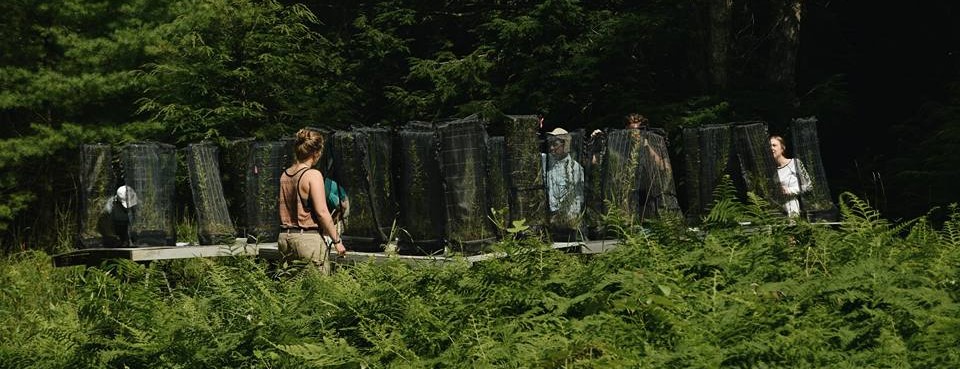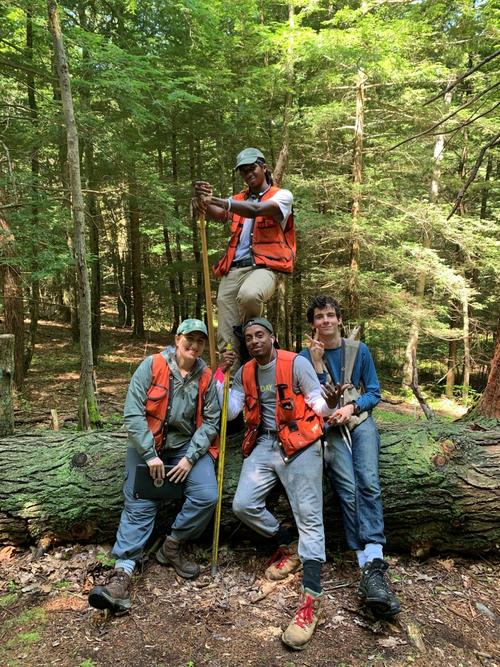Ingalls Field Ecology Program
Summer Field Ecology Internship

The Yale School the Environment invites undergraduate students to spend the summer gaining hands-on experience in field ecology research through the Louise H. and David S. Ingalls Field Ecology Program.
In 2026, the program will run from May 26-August 1. The Ingalls program is based at the Yale-Myers Forest camp in northeastern Connecticut. Interns are matched with professors, post-doctoral researchers, and graduate students on a current research project in field ecology. Working in teams, participants will collect and/or analyze field-based ecological data. In the process, interns will gain knowledge, and skills related to their research subject area, as well as to working outdoors. Housing is provided.
Work - and life - is largely conducted outdoors during the summer in New England, which includes traversing uneven terrain, heat, humidity, rain, a variety of insects, and sometimes cold. Yale-Myers Forest is located in a rural landscape - though the cities of Hartford, Providence, Boston, and New Haven are within 1-1.5 hrs drive, the forest itself can feel remote, especially if you have not spent time in rural areas before. If you are interested in the program but uncertain about living or working with any of those elements, we would still like to hear from you! We are happy to discuss further about whether the program is a good fit, and how we might accomodate your needs.
The 2026 application period will open on January 12th and will close on February 8th at 11:59pm. For questions, please contact YMFresearch@yale.edu.
Details about the program and the application process can be found below:
Research Projects for 2025
Research plans for the 2026 field season are still developing, and exact projects may be subject to change. At present, we expect that interns will work one or more of the following:
Long-term research in silviculture & forest ecology:
Working with the Silviculture Lab, interns will work on a variety of studies looking at the influence of environment and land-use on ecological communities. Studies include monitoring regeneration vegetation in shelterwood treatments and surveying floristic patterns across the Yale-Myers Forest. Students will learn and practice plant identification and forest mensuration skills while collectin data on several long-term studies that have shaped scientific understanding of how the forests of our region grow and develop.
Regionally-adapted agroforestry systems:
Details TBA.
Location, Food & Lodging
Interns will live within the vibrant summer population of the Yale-Myers Forest camp — a small, close-knit community of researchers and graduate student apprentices in forest management. Bunkhouse housing is available on-site free of charge for all interns. Food (including hot dinners and ingredients to make breakfast & lunch) are provided during the work week for a cost which varies yearly, but is usually about $12-15/day. A portion of the stipend is ($500) is intended to offset this cost, and is disbursed at the start of the summer so that interns can pay in advance for the cost of meals.
There are ample opportunities for recreation such as canoeing, swimming, hiking, and generally enjoying a beautiful location. Camp has electricity and wifi. Yale-Myers Forest camp is located 40 minutes from Hartford, and is within a 1.5 hour drive of Boston, Providence, and New Haven.
Qualifications
Interns should be undergraduate students looking for research experience to further their academic goals. Some coursework in environmental science is useful, but not required.
Funding
All interns will recieve a stipend. The stipend amound for 2026 is still being determined based on funding availability. The 2025 stipend was $5,500 - $500 of which is intended to offset the cost of food during the program. While the Ingalls program has some funding to provide stipends directly, we ask that you contact the program manager (YMFResearch@yale.edu) if your college or university has funding available for summer research or internships.
We are happy to provide supporting materials for any students’ applications for funding. Please reach out if you are considering applying for the internship and are preparing funding applications. Many fellowships require letters of support from sponsors, so please contact us to talk about your application early in the process.
Yale students should apply concurrent for this internship with other Summer Funding Opportunities. These can be found on the Yale Fellowship and Funding Database. Some fellowships that our students have received include the EVST Summer Fellowship ; First year Yale students should also consider the First Year Summer Research Fellowship in the Sciences and Engineering . In addition, the Richter Summer Fellowships are available through the residential colleges.
To Apply
Applications for the 2026 season are due by end of day on February 8th. After submitting an application, you may be asked to have an interview with program staff or a research project lead. We expect to notify applicants of decisions in mid-March. If you need an update on the status of your application before March, please contact us.
Please email the materials below as a single word (.doc or .docx) or pdf document to Laura Green (Research & Extension Forester) at YMFresearch@yale.edu. Please include Ingalls in the title of your email, and please title your application materials document as “YourName_IngallsApplication_2025”.
Application Materials Checklist:
- CV or resume, including relevant coursework and contact information (phone, email, and mailing address)
- Unofficial transcript
- Personal Statement / Letter of Interest (500–1500 words): This is an opportunity for you to help us get to know you and why you are interested in the Ingalls program. We are particularly interested in the following:
- Your academic, personal, and/or professional interests in ecology,
- What you hope to learn during this program,
- Your background and personal experiences, and how they intersect with your interest in ecology,
- Your career and personal objectives.
- Projects of interest (50-250 words): Please share which project(s) you are interested in working on, and any context for your interests that you wish to share. This can be included in the same document with your personal statement.
- Driver’s Licence & Willingness to Drive: To assist in team assignments, we ask applicants to let us know if you have a US drivers license, and if so, whether you would be willing to drive either your own vehicle (with mileage reimbursement) or a provided work vehicle to get to field sites. Neither a drivers license nor personal vehicle are required for the internship, but this information helps us plan logistics for the summer.
- Reference: Name and contact information for a faculty member who could provide a reference for you.
- For Yale Students: Where you have applied or will be applying for internal funding
- For non-Yale students: Whether you have any funding available to support your summer experience, or if you need help securing funding

A group of the 2019 Ingalls Field Ecology Interns at their field site. Photo by D. Woodbury.